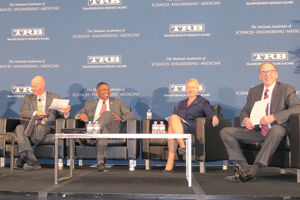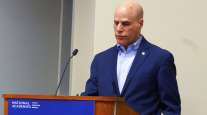What Keeps State DOT Leaders Awake at Night

“We’re facing changes we haven’t faced since the beginning of the 1900s,” former mayor and business owner Schroer said, comparing the introduction of cars and trucks a century ago to the coming era of autonomous vehicles.
Cohan mentioned the usual concerns of safety, traffic and infrastructure condition before launching into a top 10 list that included employee and contractor malfeasance, a lack of vision, and hearing “because we’ve always done in that way,” a phrase she has banned in her department.
Wilson, chief of staff to his three predecessors, joined Schroer, Braceras and Richards in citing employee deaths as his top worry since becoming secretary last year.
“I worry about people doing the wrong thing for the wrong reasons,” said Braceras, who was Utah’s deputy director for 12 years before assuming the top spot in 2013. “No one cares about transportation except when it doesn’t work.”
All the leaders went on to address the challenges in their states with Schroer, who has been on the job for six years, saying that Tennessee’s DOT is alone among the state’s 22 departments in “touching everyone’s lives every day.”
Wilson lamented Louisiana’s funding shortfall, which he worries will turn the Department of Transportation and Development into the Department of Highway Maintenance because the state won’t be able to afford anything else.
In contrast, Richards noted her good fortune in taking over two years into a five-year funding program, although not one nearly robust enough to meet all of Pennsylvania’s needs.
Braceras did that in helping persuade Utah’s conservative Legislature to increase fuel taxes in 2015 for the first time in 18 years. He said a key to that was “making it a business discussion, not a pothole discussion. If we can keep our pavement and bridges in good condition … there’ll be more money to invest in [nontransportation priorities]. It’s a conservative principle to take care of what you have.”




